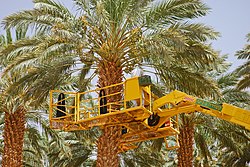
Back الزراعة في إسرائيل Arabic Agricultura a Israel Catalan Zemědělství v Izraeli Czech Agricultura en Israel Spanish کشاورزی در اسرائیل Persian Agriculture en Israël French החקלאות בישראל HE इसराइल में कृषि Hindi Pertanian di Israel ID ഇസ്രായേലിലെ കൃഷി Malayalam



Agriculture in Israel is a highly developed industry. Israel is an exporter of fresh produce and a leader in agricultural technologies. The southern one-half of Israel is desert. The northern one-half is more conducive for agriculture. According to the World Bank, 29.7 percent of Israel is agricultural land.[1] The shortage of water is a constraint. In 2008, agriculture represented 2.5% of total GDP and 3.6% of exports.[2] Israel is not self-sufficient in growing food. In 2021, Israel's agricultural imports totaled 8,791 million and agricultural exports totaled 2,445 million dollars.[3] Grains, oilseeds, meat, coffee, cocoa, and sugar were among the imports.[2][4]
Israel is home to two unique types of agricultural communities, the kibbutz and moshav, which developed as Jews from all over the world immigrated to the land that became the country of Israel and embarked on rural settlement.[5] As of 2016, kibbutzim provided Israel with about 40% of its agricultural produce.[6]
- ^ "Agricultural Land (sq. km) -- Israel". World Bank Open Data. Retrieved 20 March 2024.
- ^ a b "Agriculture in Israel". Retrieved 2008-03-01.
- ^ "Israel -- Country Commercial Guide". International Trade Administration. Retrieved 20 March 2024.
- ^ Sauer, Corinne; Kirshenbaum, Shaul (21 January 2014). "Israelis give more than NIS 4 billion a year in subsidies to farmers". The Jerusalem Post. Retrieved 28 August 2022.
- ^ "Kibbutz and Moshav". Country Studies. Retrieved 29 June 2015.
- ^ Regev, Dana (16 May 2016). "Israeli kibbutz: Communal idealism or a privileged few?". Deutsche Welle. Retrieved 22 April 2022.
© MMXXIII Rich X Search. We shall prevail. All rights reserved. Rich X Search